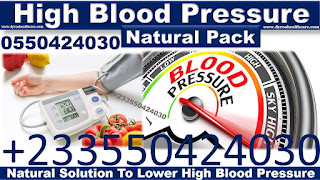NATURAL SOLUTION FOR HIGH BLOOD PRESSURE
NORMALIZE HIGH BP IN JUST 21 DAYS PERMANENTLY
High blood pressure (hypertension) is defined as high pressure (tension) in the arteries, which are the vessels that carry blood from the heart to the rest of the body.Blood pressure readings are given as two numbers. The systolic blood pressure (the top number) equals the pressure in the arteries as the heart contracts. The diastolic pressure (the bottom number) is the pressure in the arteries as the heart relaxes. Normal blood pressure is below 120/80; blood pressure between 120/80 and 139/89 is called “pre-hypertension,” and a blood pressure of 140/90 or above is considered high while a systolic blood pressure of about 90 to 100 is considered low blood pressure.
Complications of high blood pressure include heart disease, kidney (renal) disease, hardening of the arteries (atherosclerosis or arteriosclerosis), eye damage, and stroke (brain damage).
The causes of hypertension are multifactorial, meaning there are several factors whose combined effects produce hypertension.
- High salt intake or salt sensitivity: This occurs in certain populations such as the elderly, African Americans, people who are obese, or people with kidney (renal) problems.
- Genetic predisposition to high blood pressure: People who have one or two parents with hypertension have high blood pressure incidence about twice as high as the general population.
- A particular abnormality of the arteries, which results in an increased resistance (stiffness or lack of elasticity) in the tiny arteries (arterioles): This increased peripheral arteriolar stiffness
Blood pressure readings can vary in a single person throughout the day depending on the situation. Factors such as stress, anxiety, foods eaten (caffeine or salt intake), smoking, or exercise can cause pressure to rise.
The American Heart Association defines a normal blood pressure as less than 120/80. Pre-hypertension ranges between 120/80 and 139/89, and high blood pressure is 140/90 and higher. In pregnancy normal blood pressure should be below 120/80.
 If your blood pressure reaches into the high range, you should see your doctor about lifestyle modification and possibly medication especially if you have other risk factors, such as diabetes or heart disease.
If your blood pressure reaches into the high range, you should see your doctor about lifestyle modification and possibly medication especially if you have other risk factors, such as diabetes or heart disease.High blood pressure (for example, 180/110 or higher) may indicate an emergency situation. If this high blood pressure is associated with chest pain, shortness of breath, headache, dizziness, or back or abdominal pain, seek medical care immediately. If you are experiencing no associated symptoms with a high blood pressure reading such as this, re-check it again within a few minutes and contact your doctor or go to an emergency room if it is still high.
If your blood pressure is lower than about 100/60 you may have low blood pressure, depending on the associated symptoms. If you are unsure, check with your doctor.
High blood pressure may not have any symptoms and so hypertension has been labeled “the silent killer.” Longstanding high blood pressure can lead to multiple complications including heart attack, kidney disease, or stroke.Some people experience symptoms with their high blood pressure. These symptoms include:
- Headache
- Dizziness
- Shortness of breath
- Blurred vision
- Feeling of pulsations in the neck or head
- Nausea
What are the potential risks and complications of untreated high blood pressure?
Complications of hypertension are often referred to as end-organ damage because damage to the organs is the end result of chronic (long duration) high blood pressure.High blood pressure increases the risk of developing:
- Heart disease: Increased workload on the heart from pushing against the high blood pressure can cause enlargement of the heart muscle, heart failure, coronary artery disease, and cardiac arrhythmias.
- Kidney disease: High blood pressure damages the filtration system within the kidneys causing proteins to spill out into the urine. These proteins cause further damage to the kidneys and can lead to kidney failure.
- Hardening of the arteries (atherosclerosis): Increased pressure through the arteries and arterioles causes damage to the inner walls of the blood vessels, resulting in hardened arteries.
- Increased risk of aneurysms: Increased pressure can also cause stretching or dilation of the blood vessels, which can result in aneurysms.
- Eye damage: The sensitive tissues within the eyes are prone to damage from high blood pressure.
- Stroke: Both the hardening of the arteries and the dilation of the blood vessels due to high blood pressure can lead to strokes.


0 Comments:
Post a Comment
Subscribe to Post Comments [Atom]
<< Home